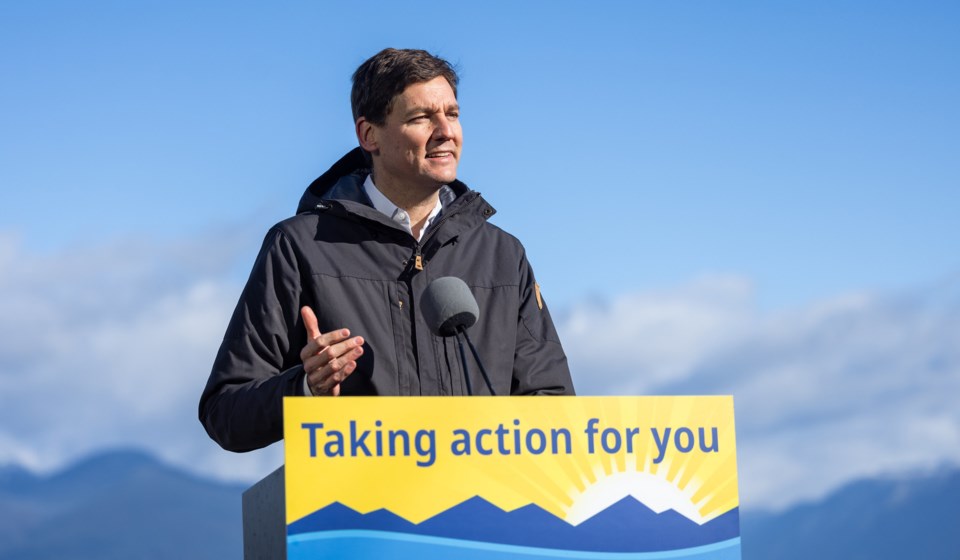For the past few years, the issue of housing, homelessness and poverty has been at the top of the list when British Columbians are asked about the most important issue facing the province.
Research Co. and Glacier Media have tracked the perceptions of British Columbians on specific policies related to housing since June 2018, when the introduction of a “speculation tax” on vacant homes was backed by 62 per cent of the province’s residents.
This year, more than two-thirds of British Columbians continue to endorse three policies that were implemented by the previous provincial administration headed by John Horgan: Increasing the foreign buyers tax to 20 per cent (74 per cent, down three points since January 2023), expanding the foreign buyers tax outside of Metro Vancouver (71 per cent, down four points) and introducing the “speculation tax” (69 per cent, down three points).
More than three in five of the province’s residents are also on board with two other measures: Increasing the property transfer tax on homes valued at more than $3 million (62 per cent, down three points) and introducing new tax rates on homes valued at more than $3 million (also 62 per cent, down six points).
The first batch of policies to arrive after David Eby took over as premier are also popular, with more than two-thirds of British Columbians agreeing with building more modular supportive homes in areas where people are experiencing homelessness (75 per cent, down three points) and implementing a three-business-day protection period for financing and home inspections (69 per cent, down two points). Majorities are also in favour of capping rent increases in 2024 at 3.5 per cent (66 per cent) and ending most strata age restrictions (60 per cent, down four points).
Two more recent policies related to “alternatives to hotels” are also well received. Some 69 per cent are in favour of raising the fines for short-term rental hosts who break local municipal by-laws to $3,000 per day per infraction, and 58 per cent agree with banning homeowners from operating a short-term rental business unless it is located on their principal residence and/or on a different unit on their property.
Two policies are more contentious. Just 52 per cent of the province’s residents (down seven points) agree with the removal of strata rental restrictions and about half (49 per cent) welcome the provincial government’s decision to implement a $400 renters’ rebate for households earning up to $80,000 a year. Just under three in 10 (29 per cent, down one point) believe the home owner grant, which reduces the amount of property tax people pay for their principal residence, should be cancelled.
The federal government recently announced that the ban on non-Canadians purchasing residential properties in Canada will remain in place until 2027. This idea has always been popular across B.C. and 2024 is no exception, with 70 per cent of residents (down one point) supporting this course of action. In addition, practically two-thirds of British Columbians (65 per cent, up four points) want Ottawa to tie immigration numbers to affordable housing targets and new housing starts.
British Columbians are split when asked to look into the future. Some 41 per cent (down seven points) say B.C.’s actions will make housing more affordable. A slightly higher proportion (47 per cent, up six points) think the efforts will be ineffective.
Age provides a key layer of analysis on this question. Confidence in a positive outcome for the government’s housing plans stands at 37 per cent among British Columbians aged 35 to 54 and at 38 per cent among those aged 55 and over. Conversely, more than half of those aged 18 to 34 (52 per cent) maintain faith that the policies will ultimately be successful.
The fact that confidence in the government’s actions is lower than it was last year may suggest animosity towards the ruling party, but the opposition is not gaining ground on this particular issue. Trust in the BC NDP to deliver affordable housing while in government stands at 46 per cent, significantly ahead of the numbers posted when residents ponder provincial administrations headed by the BC Greens (35 per cent), the BC Conservatives (32 per cent) and BC United (29 per cent).
There are many weeks left for voters to assess the housing proposals of opposition parties. They may ultimately be as popular as one idea espoused by the BC Liberals six years ago.
Establishing a provincial capital-gains tax on any profit from the sale of housing units before construction is completed was supported by 65 per cent of British Columbians. At this point, while almost half of the province’s residents appear dejected about the current state of affairs, support for both old and new housing policies has not dropped considerably.
Mario Canseco is president of Research Co.
Results are based on an online study conducted on Feb. 8-10, 2024, among 800 adults in British Columbia. The data has been statistically weighted according to Canadian census figures for age, gender and region in B.C. The margin of error — which measures sample variability — is plus or minus 3.5 percentage points, 19 times out of 20





